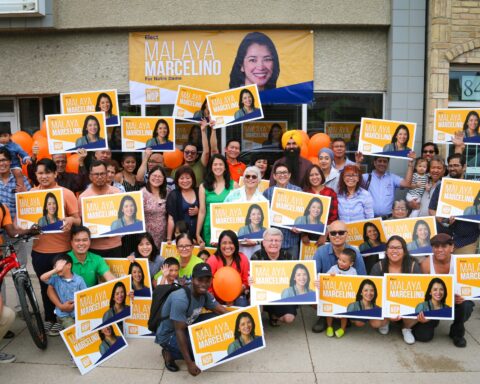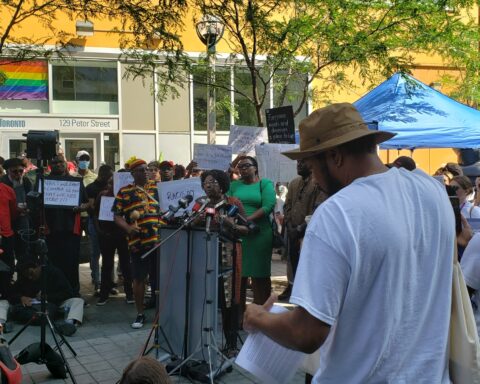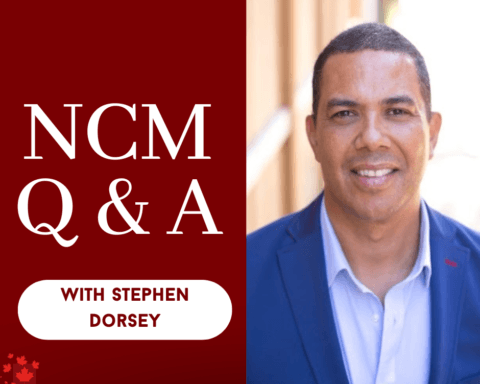Educator Kelly Reimer knows racism is a problem, but not just in Winnipeg – throughout all of Canada.
“I don’t think the city is racist because we have people saying mean things to each other,” says Reimer, reflecting on a January 2015 Macleans cover story that slammed Winnipeg as the most racist city in Canada, a statement the high school teacher doesn’t agree with. “I think it’s primarily because we live in a racist society where there are structures in place that have dispossessed some and privileged others.”
It seems that a city that has been able to provide a base for many immigrant communities to succeed, has, at the same time, failed its own Aboriginal communities.
Reimer says there is a wider system at play – the continued colonization of Canada’s Indigenous people is at the core of what Aboriginals encounter today.
And it’s an uphill battle.
A report by the Canadian Centre of Policy Alternatives (CCPA) indicates that 62 per cent of First Nations children in Manitoba live in poverty, which is outrageous by Canadian standards. Furthermore, the unemployment rate among Aboriginals is nearly three times as high compared to non-Aboriginals living in Winnipeg.
It seems that a city that has been able to provide a base for many immigrant communities to succeed, has, at the same time, failed its own Aboriginal communities. Reimer suggests this is because Canada was founded on the dispossession of Indigenous people, and not on the exploitation of other immigrant communities.
Some Racism Declining
Take, for example, Winnipeg’s Filipino community, which in broad terms, has successfully integrated into everyday life in Manitoba.
President of the Philippine-Canadian Centre of Manitoba, Lou Fernandez, says racism towards immigrant groups, including the Filipino community, has decreased tremendously since the 1970s.
“Now there is a higher acceptance of Filipinos in Winnipeg and we’ve earned the respect that we deserve.” – Lou Fernandez, Phillippine-Canadian Centre of Manitoba
“We had struggles in the ’70s and ’80s, but I think the battles we were fighting before have nearly disappeared,” he explains. “Now there is a higher acceptance of Filipinos in Winnipeg and we’ve earned the respect that we deserve.”
As a Citizenship and Immigration Canada (CIC) report identified many of the Filipino immigrants who came to Canada early on came in the ’50s, and ’60s were part of a professional class – social workers, teachers, nurses and technicians – almost all of whom resided in Winnipeg. Winnipeg has the oldest Filipino community in the country, and arguably the strongest, based on its level of integration.
Combatting Negative Stigma
While Fernandez has seen vast improvements within his own community and with other immigrant groups over the years, he admits Aboriginal communities always had it worse.
“There are so many of Aboriginals being deprived of certain services, maybe because of how they dress, how they act or speak,” Fernandez explains. “For example, many of the panhandlers in Winnipeg are from Aboriginal communities and it’s these type of things that affect the amount of respect that they receive. It’s not always about racism per se, but the lack of respect they get because of how they are seen in the public.”
This might help explain why in 2008 an Aboriginal man, 45-year-old Brian Sinclair, 45 died in a Winnipeg hospital emergency waiting room after a 34-hour wait. It was reported that hospital staff assumed he was “sleeping it off,” when he was actually suffering from a bladder infection, which eventually killed him.
Reimer says there has to be an effort to break away from these types of negative associations that Indigenous people suffer from – racialized poverty, unemployment and incarceration, which are embedded in large structural issues. For example, the aforementioned CCPA study reported that Aboriginals represented nearly 70 per cent of those incarcerated in Manitoba, a severe over-representation as they only represent 15 per cent of the province’s population.
For Reimer, who teaches English and history, increasing awareness of different Aboriginal cultures and immigrant groups with his students to combat negative perceptions has become second nature.
“My school is very mixed, ethnically, culturally and nationally,” Reimer says. “Part of it is to deal with history in the most meaningful way, and part of it is to respect the students who are in front of you and encourage their mutual respect for each other to break barriers in the classroom.”
Teaching Aboriginal History
The learning has to extend beyond the classroom, though, as some say it is vital for new immigrant communities settling in Manitoba to also be educated about the dire situation of Aboriginals.
Jude Kasas, part of the developing Syrian community and member of the Syrian Assembly of Manitoba (SAM), immediately recognized the ingrained stigma towards the Aboriginal communities.
“I had no issues with racism, but there’s racism in Winnipeg, and it’s mainly directed to the Aboriginals,” he says.
“If long-time Canadians are ignorant about the history of this land, then immigrants are at risk of becoming more ignorant since they don’t know the background and history with Aboriginal people.” – Jude Kasas, Syrian Assembly of Manitoba
Kasas, who worked in a community clinic while attending the University of Winnipeg downtown, often witnessed racism. He is concerned about how the existing stigma influences newcomers.
“If long-time Canadians are ignorant about the history of this land, then immigrants are at risk of becoming more ignorant since they don’t know the background and history with Aboriginal people,” he says.
To battle this phenomenon, Kasas is part of a team trying to educate new Syrian immigrants by teaching the history of how Canada became a country, hoping they will learn more about Aboriginal issues and be part of the solution, not the problem.
Since the Macleans article released, many Winnipeg residents have taken a stand against racism including Phillipe Burns, one organizer behind S.T.A.R.T. (Students Together Against Racism Today). The 18-year-old says he wants Aboriginal history to be a mandatory part of the curriculum.
Kasas suggests that all immigrants on their way to becoming Canadian citizens should not only be educated about Aboriginal history, but also be informed about why Aboriginals continue to face such adversity today.
It’s these types of efforts from teachers, students and new Canadians that help curb racism at the community and school level, but to really address the deeper issues affecting the Aboriginal population there needs to be a combination of effort from the province and the federal government.
Reimer emphasizes changes are needed in the social, political and economic system to end the ongoing practice of colonization and break down cultural divides.
“Regardless of how effective these programs are we don’t solve the problems of poverty, housing, inequality or unemployment,” he says. “We are one institution that lives in a wider system. We don’t have the capacity to restructure, Winnipeg, Manitoba or Canada, but we try to figure out what we can do, and we try to do what we can.”
Return here next Monday for the third and final instalment of this series as our investigative team takes a closer look at what’s being done to combat racism in Winnipeg.
Mark is an entrepreneur, freelance writer and former journalist. He currently works as a brand consultant.





